Unit 4 Don’t eat in class 单元整体教学纲要
文档属性
| 名称 | Unit 4 Don’t eat in class 单元整体教学纲要 | 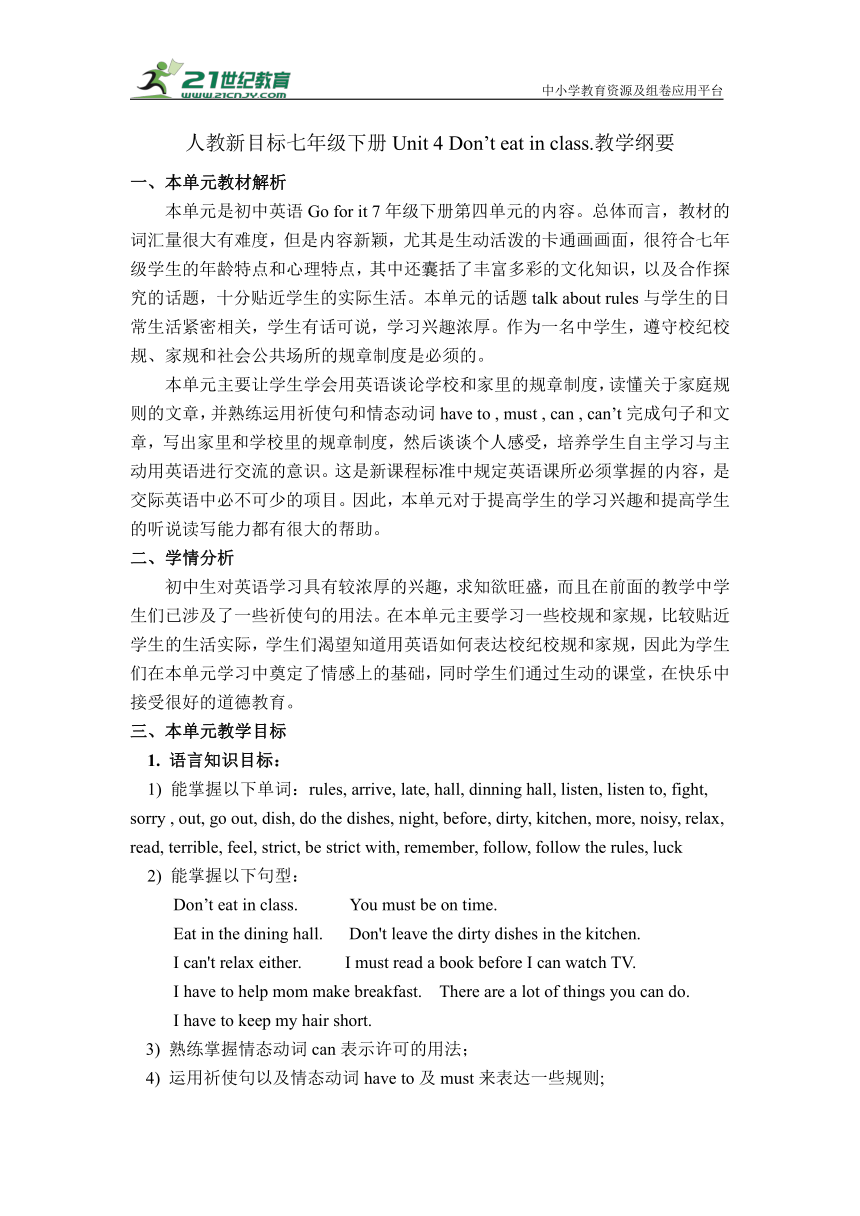 | |
| 格式 | docx | ||
| 文件大小 | 152.9KB | ||
| 资源类型 | 试卷 | ||
| 版本资源 | 人教新目标(Go for it)版 | ||
| 科目 | 英语 | ||
| 更新时间 | 2022-08-26 09:12:58 | ||
图片预览

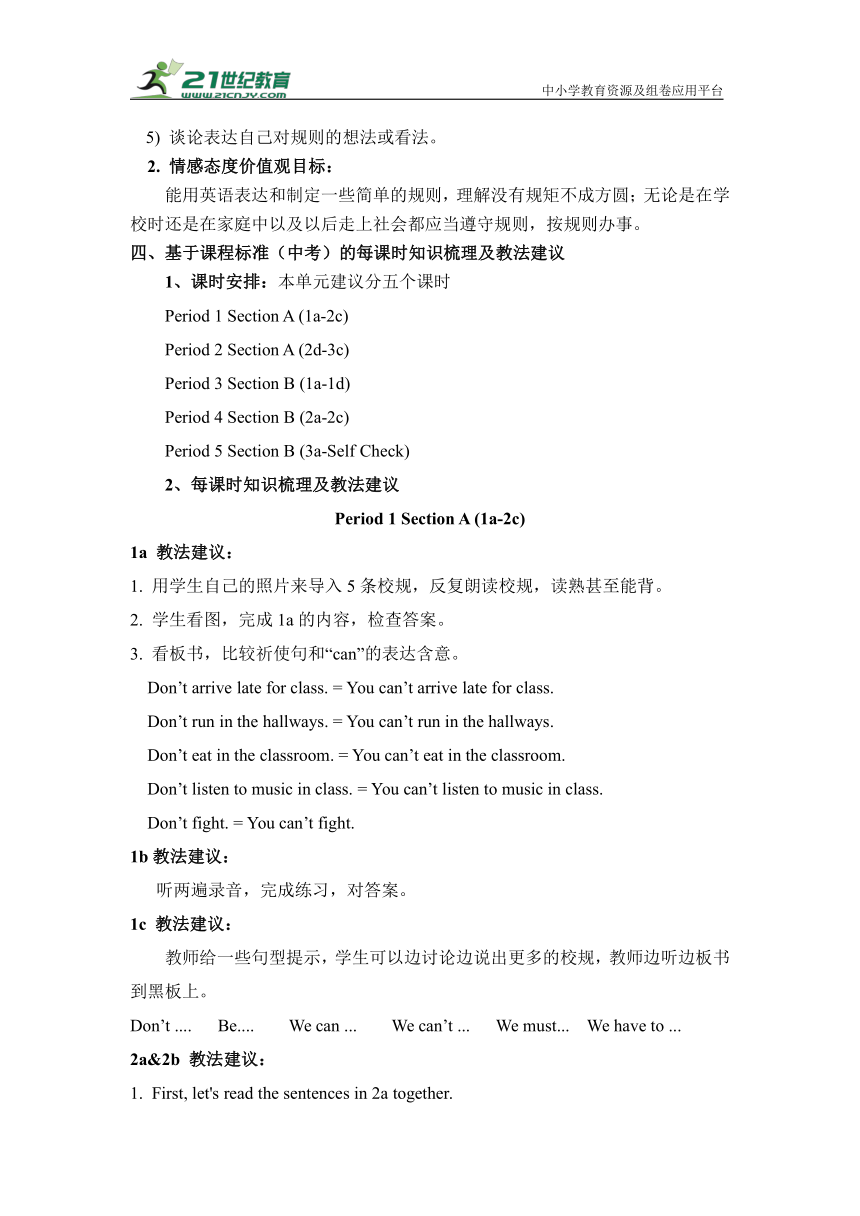
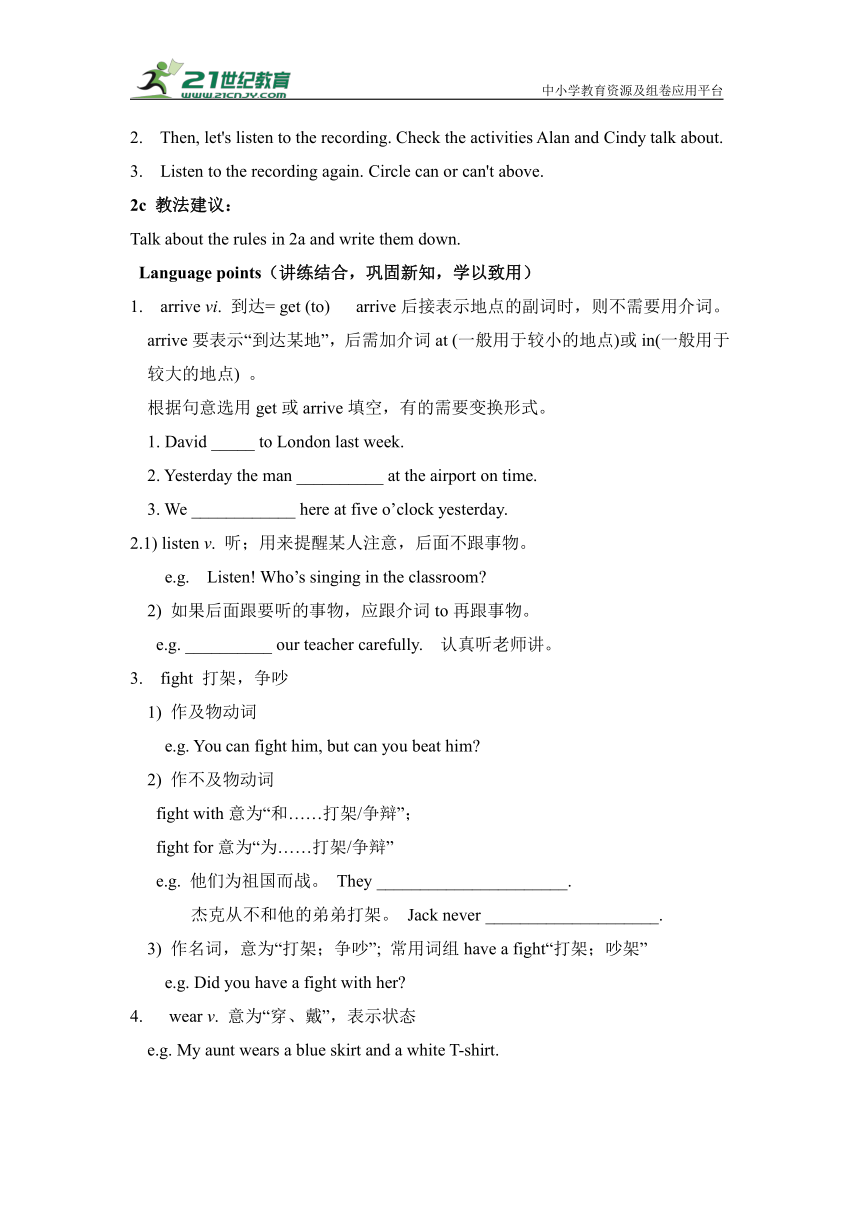
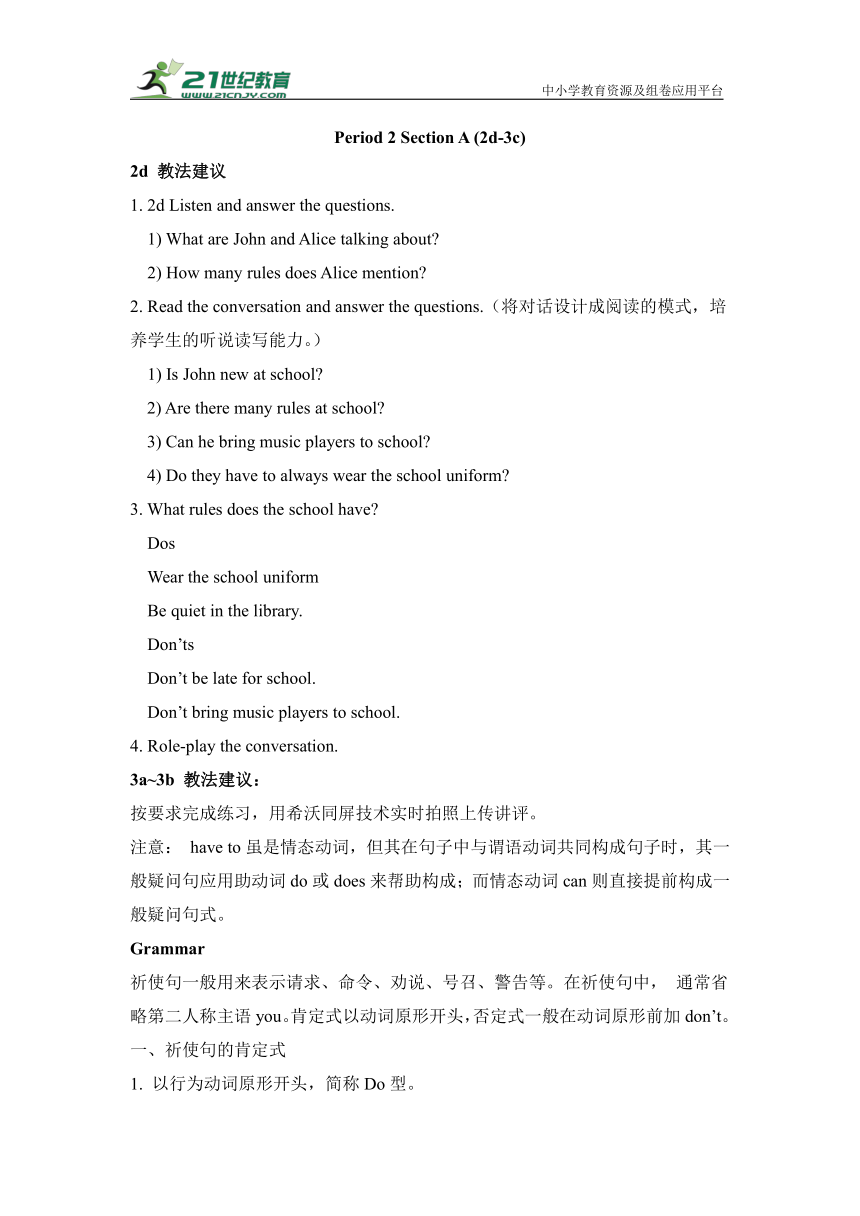
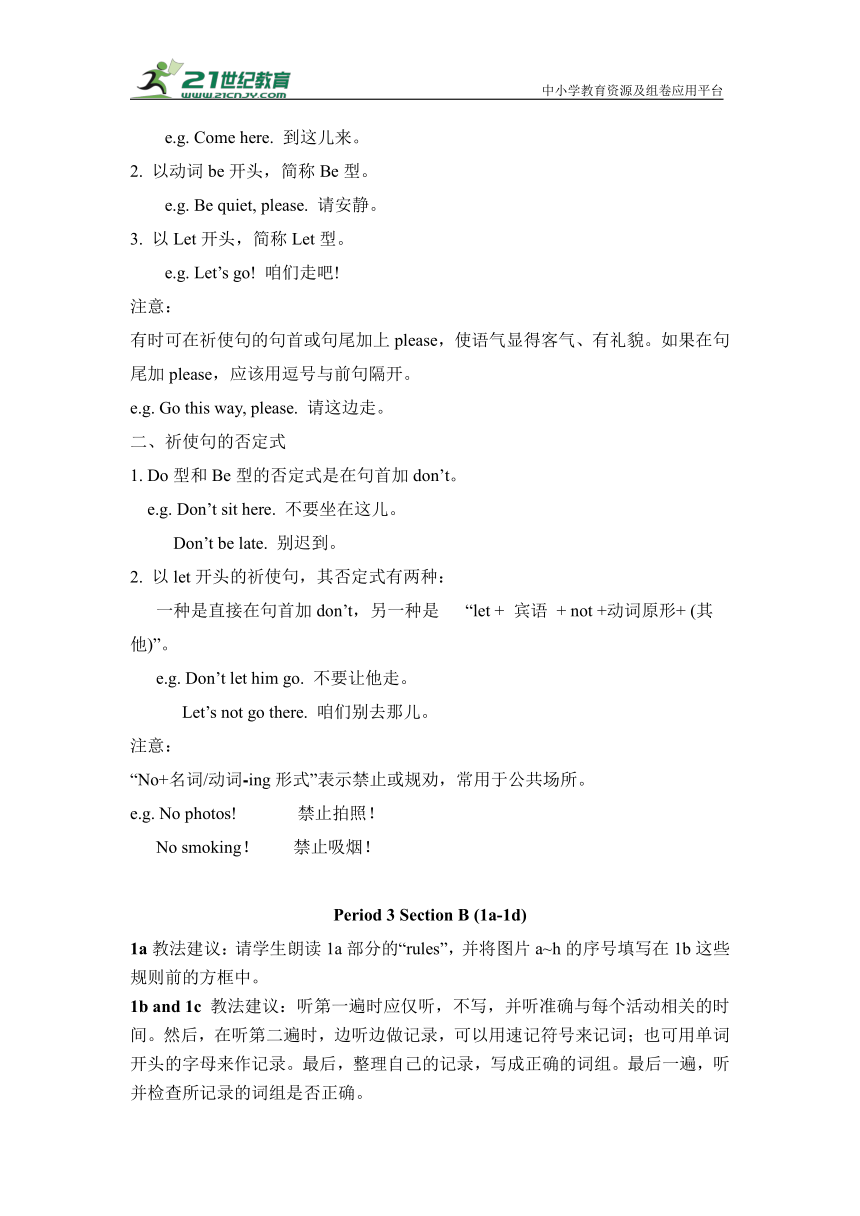
文档简介
中小学教育资源及组卷应用平台
人教新目标七年级下册Unit 4 Don’t eat in class.教学纲要
一、本单元教材解析
本单元是初中英语Go for it 7年级下册第四单元的内容。总体而言,教材的词汇量很大有难度,但是内容新颖,尤其是生动活泼的卡通画画面,很符合七年级学生的年龄特点和心理特点,其中还囊括了丰富多彩的文化知识,以及合作探究的话题,十分贴近学生的实际生活。本单元的话题talk about rules与学生的日常生活紧密相关,学生有话可说,学习兴趣浓厚。作为一名中学生,遵守校纪校规、家规和社会公共场所的规章制度是必须的。
本单元主要让学生学会用英语谈论学校和家里的规章制度,读懂关于家庭规则的文章,并熟练运用祈使句和情态动词have to , must , can , can’t完成句子和文章,写出家里和学校里的规章制度,然后谈谈个人感受,培养学生自主学习与主动用英语进行交流的意识。这是新课程标准中规定英语课所必须掌握的内容,是交际英语中必不可少的项目。因此,本单元对于提高学生的学习兴趣和提高学生的听说读写能力都有很大的帮助。
二、学情分析
初中生对英语学习具有较浓厚的兴趣,求知欲旺盛,而且在前面的教学中学生们已涉及了一些祈使句的用法。在本单元主要学习一些校规和家规,比较贴近学生的生活实际,学生们渴望知道用英语如何表达校纪校规和家规,因此为学生们在本单元学习中奠定了情感上的基础,同时学生们通过生动的课堂,在快乐中接受很好的道德教育。
三、本单元教学目标
1. 语言知识目标:
1) 能掌握以下单词:rules, arrive, late, hall, dinning hall, listen, listen to, fight, sorry , out, go out, dish, do the dishes, night, before, dirty, kitchen, more, noisy, relax, read, terrible, feel, strict, be strict with, remember, follow, follow the rules, luck
2) 能掌握以下句型:
Don’t eat in class. You must be on time.
Eat in the dining hall. Don't leave the dirty dishes in the kitchen.
I can't relax either. I must read a book before I can watch TV.
I have to help mom make breakfast. There are a lot of things you can do.
I have to keep my hair short.
熟练掌握情态动词can表示许可的用法;
运用祈使句以及情态动词have to及must来表达一些规则;
谈论表达自己对规则的想法或看法。
2. 情感态度价值观目标:
能用英语表达和制定一些简单的规则,理解没有规矩不成方圆;无论是在学校时还是在家庭中以及以后走上社会都应当遵守规则,按规则办事。
四、基于课程标准(中考)的每课时知识梳理及教法建议
1、课时安排:本单元建议分五个课时
Period 1 Section A (1a-2c)
Period 2 Section A (2d-3c)
Period 3 Section B (1a-1d)
Period 4 Section B (2a-2c)
Period 5 Section B (3a-Self Check)
2、每课时知识梳理及教法建议
Period 1 Section A (1a-2c)
1a 教法建议:
用学生自己的照片来导入5条校规,反复朗读校规,读熟甚至能背。
学生看图,完成1a的内容,检查答案。
看板书,比较祈使句和“can”的表达含意。
Don’t arrive late for class. = You can’t arrive late for class.
Don’t run in the hallways. = You can’t run in the hallways.
Don’t eat in the classroom. = You can’t eat in the classroom.
Don’t listen to music in class. = You can’t listen to music in class.
Don’t fight. = You can’t fight.
1b教法建议:
听两遍录音,完成练习,对答案。
1c 教法建议:
教师给一些句型提示,学生可以边讨论边说出更多的校规,教师边听边板书到黑板上。
Don’t .... Be.... We can ... We can’t ... We must... We have to ...
2a&2b 教法建议:
First, let's read the sentences in 2a together.
Then, let's listen to the recording. Check the activities Alan and Cindy talk about.
Listen to the recording again. Circle can or can't above.
2c 教法建议:
Talk about the rules in 2a and write them down.
Language points(讲练结合,巩固新知,学以致用)
1. arrive vi. 到达= get (to) arrive后接表示地点的副词时,则不需要用介词。
arrive要表示“到达某地”,后需加介词at (一般用于较小的地点)或in(一般用于较大的地点) 。
根据句意选用get或 arrive填空,有的需要变换形式。
1. David _____ to London last week.
2. Yesterday the man __________ at the airport on time.
3. We ____________ here at five o’clock yesterday.
2.1) listen v. 听;用来提醒某人注意,后面不跟事物。
e.g. Listen! Who’s singing in the classroom
2) 如果后面跟要听的事物,应跟介词to再跟事物。
e.g. __________ our teacher carefully. 认真听老师讲。
3. fight 打架,争吵
1) 作及物动词
e.g. You can fight him, but can you beat him
2) 作不及物动词
fight with意为“和……打架/争辩”;
fight for意为“为……打架/争辩”
e.g. 他们为祖国而战。 They ______________________.
杰克从不和他的弟弟打架。 Jack never ____________________.
3) 作名词,意为“打架;争吵”; 常用词组have a fight“打架;吵架”
e.g. Did you have a fight with her
4. wear v. 意为“穿、戴”,表示状态
e.g. My aunt wears a blue skirt and a white T-shirt.
Period 2 Section A (2d-3c)
2d 教法建议
1. 2d Listen and answer the questions.
1) What are John and Alice talking about
2) How many rules does Alice mention
2. Read the conversation and answer the questions.(将对话设计成阅读的模式,培养学生的听说读写能力。)
1) Is John new at school
2) Are there many rules at school
3) Can he bring music players to school
4) Do they have to always wear the school uniform
3. What rules does the school have
Dos
Wear the school uniform
Be quiet in the library.
Don’ts
Don’t be late for school.
Don’t bring music players to school.
4. Role-play the conversation.
3a~3b 教法建议:
按要求完成练习,用希沃同屏技术实时拍照上传讲评。
注意: have to虽是情态动词,但其在句子中与谓语动词共同构成句子时,其一般疑问句应用助动词do或does来帮助构成;而情态动词can则直接提前构成一般疑问句式。
Grammar
祈使句一般用来表示请求、命令、劝说、号召、警告等。在祈使句中, 通常省略第二人称主语you。肯定式以动词原形开头,否定式一般在动词原形前加don’t。
一、祈使句的肯定式
1. 以行为动词原形开头,简称Do型。
e.g. Come here. 到这儿来。
2. 以动词be开头,简称Be型。
e.g. Be quiet, please. 请安静。
3. 以Let开头,简称Let型。
e.g. Let’s go! 咱们走吧!
注意:
有时可在祈使句的句首或句尾加上please,使语气显得客气、有礼貌。如果在句尾加please,应该用逗号与前句隔开。
e.g. Go this way, please. 请这边走。
二、祈使句的否定式
1. Do型和Be型的否定式是在句首加don’t。
e.g. Don’t sit here. 不要坐在这儿。
Don’t be late. 别迟到。
2. 以let开头的祈使句,其否定式有两种:
一种是直接在句首加don’t,另一种是 “let + 宾语 + not +动词原形+ (其他)”。
e.g. Don’t let him go. 不要让他走。
Let’s not go there. 咱们别去那儿。
注意:
“No+名词/动词 ing形式”表示禁止或规劝,常用于公共场所。
e.g. No photos! 禁止拍照!
No smoking! 禁止吸烟!
Period 3 Section B (1a-1d)
1a教法建议:请学生朗读1a部分的“rules”,并将图片a~h的序号填写在1b这些规则前的方框中。
1b and 1c 教法建议:听第一遍时应仅听,不写,并听准确与每个活动相关的时间。然后,在听第二遍时,边听边做记录,可以用速记符号来记词;也可用单词开头的字母来作记录。最后,整理自己的记录,写成正确的词组。最后一遍,听并检查所记录的词组是否正确。
1d 教法建议:将学生分成7组,根据1b中的信息小组合作学习,每位组员说一条Dave的家规,组长负责记录。然后再请组长分享小组成果—Dave’s Family Rule(用班级优化大师随机抽选小组分享成果)。
Language points
_________ the guitar 练习吉他
practice v. 意为“练习”后面可跟名词、代词或动名词。
e.g. I must practice English every morning.
我每天早晨必须练习英语。
Mr. Xu practices doing Kong fu every day. 许先生每天练习功夫。
Period 4 Section B (2a-2c)
2a Thinking 教法建议:学生自由谈论When you are unhappy about something, who do you like to talk to
2b Reading 教法建议:要求学生首先对文章整体感知,然后精读文章,完成相关的课堂活动,从而更进一步理解文章。
1. Fast reading
Read the letter and find the answer to this question:
What does Molly feel about the rules
2. Careful reading
1) Read the letter again and underline the rules for Molly.
2) Ss read the letter and try to find the rules for Molly and underline them.
3) Check the answers with the class.
3. Careful reading
1) Read Dr. Know's letter and answer this question:
What does she think of the school and home rules
2) Ss read Dr Know's letter and find the answer to this question.
3) Let one student read out his/her answer.
2c Reading
Read the letter again and complete the sentences with have to/ must, can or can't.
Molly ____ play basketball on school days, but she ___ play it on weekends.
2. Molly ____ do her homework first when she gets home.
3. Molly ____ read a book after dinner before she ___ watch TV.
4. At school, Molly _____ be noisy or eat in class.
5. Parents and schools make rules to help students. So students ______ follow the rules.
阅读指导:
1) 首先,认真阅读2c中的这些句子,明白它们所谈论的相关规则。
2)带着相关规则再去读2a中的信,在与之相关的内容处认真分析,理解规则的真正含义,并填上正确的词汇。
3)再次阅读这些句子一遍,看是否通顺。
4. Check the answers.
5. 求助信的特征和语言。
1) 书信称呼都是用Dear…
2) 称呼后用逗号,不用冒号,这是中英文信件区别之处。
3) 求助信中第一句是核心句,例如There are too many rules! 主题句后就是解释说明主题句的细节句。
4) 信件结束前一般会有明确求助的句子,即What can I do
Language points(讲练结合,巩固新知,学以致用)
教法建议:教师讲知识点的同时,结合例句帮助学生理解并会运用知识点。
1. Dear Dr. Know
Dr.为doctor(博士;医生;医师)一词的缩写形式,放于姓氏之前,表示对人
的尊称。Dr.采用的是首尾缩写法,取首字母和词尾字母将单词进行缩写。
2. Get up now and make your bed
make the bed/make one’s bed 整理床铺
e.g. 鲍勃总是自己整理床铺。Bob always ___________________.
3. Don’t be noisy. 翻译:___________________。
noisy adj. 意为“吵闹的”
e.g. We can’t be noisy in class. 我们不能在教室里大吵大闹。
4. After dinner, I can’t relax either.
翻译:_______________________。
副词either表示“也”,用于否定句句末,用法与表示肯定或陈述的副词too相
似,可用逗号与语句的主题隔开。
e.g. You like English. I like it, too.你喜欢英语,我也喜欢。
My father can’t speak English. My mother can’t (speak it), either.
我爸不会讲英语,我妈也不会。
5. But I have to go be bed before 10:00.
before 在……之前; after 在……之后;它们的后面可以跟表示时间的点,也可
以跟一个从句表示时间。
e.g. Wash your hands _____________. 饭前洗手。
Do your homework ___________. 放学后做作业。
Brush your teeth before you go to bed. 睡觉前刷一下牙。
Mrs. Wu usually makes dinner for the family first after she gets home.吴太太在到家之后通常先为家人做饭。
6. Parents and schools are sometimes strict,…
be strict _________ (对某人)严格的
be strict ____________ 对某事要求严格
e.g. Our math teacher is very strict. 我们的数学老师很严格。
Are your parents strict with you 你的父母对你严格吗?
The girl is very strict in doing the work. 这个女孩对工作要求严格。
7. There are a lot of things you can do.有许多你可以做的事情。
a lot of things you can do是一个名词短语,句子you can do起着修饰,限定名
词things的作用。当句子限定修饰名词时要放在该名词之后。
e.g. There are a lot of songs you can sing. 有许多歌曲你可以唱。
8. have to & must
have to 意为“不得不”,表示客观上的必要性,有人称和数的变化,其后要跟动词原形,其否定式don’t / doesn’t have to 表示“不必”。must 意为“必须”,强调说话人的主观看法,没有人称和数的变化,其后要跟动词原形,其否定式mustn’t 表示“不准;禁止”。含有have to和must的句式如下:
have to must
肯定式 主语+ have / has to +动词原形+其他. 如:I have to go now because it’s late. 主语+ must +动词原形+其他. 如:We must finish the work.
否定式 主语 + don’t / doesn’t + have to +动词原形+其他. 如:Mike doesn’t have to come before 7:00 a.m. 主语+ mustn’t +动词原形+其他. 如:You mustn’t run here.
疑问式 Do / Does +主语+have to +动词原形+其他? 如:Does Mike have to come before 7:00 a.m. Must+主语+动词原形+其他? 如:Must we finish the work
【运用】
Ⅰ. 将下列句子翻译成英语。
1. 汤姆(Tom)不得不离开这个村庄。
_____________________________________
2. 我必须打扫这个房间。
_____________________________________
Period 5 Section B (3a-Self Check)
3a 教法建议:首先,认真阅读整篇短文,理解短文的大意。然后,认真阅读每
个句子,理解作者的对这些规则的看法;同时,推敲每个句子深处的意思,确定
是用have to/must还是can/can't。最后,应再通读一遍短文,看自己所填写的词
组是否通顺正确。
Language points
1. I have to keep my hair short.
keep + 名词/ 代词 + 形容词 “保持处于……状态”
e.g. We must keep our classroom clean every day.
我们必须每天保持教室干净。
How can you keep the fruit fresh
你是怎样保持水果新鲜的?
2. I must learn to play the piano.
learn 学习;学会
1) learn + 事物
e.g. Ms. Wu helps me to learn English on weekends.
吴老师周末帮我学习英语。
2) learn to do sth. 学习做某事
e.g. Let’s learn to play chess after class. 我们下课后学习下棋吧。
3b Complete the chart with rules in your home and school.
Ss discuss their rules in groups. Then fill in the blanks. Then check the rules you think are unfair.
For example: You must wear a school uniform at school. You must keep your hair
short at school. Let some groups say their answers. Write some of the rules on the blackboard.
3c Writing
Write a letter to Dr Know. Tell her about all the rules and how you feel about them.
写作指导: 首先,可以再次阅读2b及3a中的短信的内容及格式。其次,
模仿这两封信的格式写好自己信件的格式;然后,根据刚才自己小组讨论的规则整理成一封文字通顺的信件。并且,表达自己对这些规则的想法或看法。之后,以礼貌的话语请求Dr. Know的帮助。最后,再通读一遍自己的短信看语句是否通顺。
选取几封学生的信一起来批改。第一篇老师做批改示范,第二篇用班级优化大师随机抽查学生来改,第三篇还是由学生来批改。改完的文章还需要齐读。
Self Check 1
1. Ask the Ss to read the short passage and try to fill in the blanks with the words in the box. Then check the answers.
2. Explain some sentences that Ss may have difficulty understanding them.
Self Check 2
Tell Ss they should use "can/can't; have/must; don't have to" to write about the rules at school. Write two sentences for each rule.
提示句子结构: 主语 + 情态动词 + 动词原形 + 其他
五、单元作业设计
A 基础知识类
根据汉语意思完成英语句子,每空一词(含缩略形式)。
1. 你们必须遵守规则。
You must _________ _________ ________.
2. 你每天自己铺床吗?
Do you _________ _________ _________ by yourself every day
3. 王老师对她的学生要求严格。
Miss Wang _________ _________ _________ her students.
4. 别把你的书包落在图书馆。
_________ _________ your schoolbag in the library.
5. 我不开心因为有太多的规则。
I’m not _____ because there are ___ ____ rules.
6. 在学校里我们必须保持头发很短。
We ____ ____ our hair ____ at school.
7. 放学后,我不能看电视或打篮球。
I ____ watch TV __ play basketball ____ school.
8. 在星期六我也不能休息,因为我必须要学习钢琴。
I _____ ____ on Saturday _____ because I ____ __ ____ __ play the piano.
B 易错易混类
一、语法填空:
----What do you think of your math teacher
----He's always strict __________ us.
Rick never __________ (fight) with his brothers.
I like to listen to _________ (relax) music.
I want __________ (learn) Chinese kung fu. Can you teach me
Molly, come and help me do __________ dishes.
It's very important for us __________ (eat) breakfast every morning.
Don't worry(担心). We can get to Beijing __________ time.
All the boys must keep their __________ (hair) short in our school.
I know that girl, __________ I can't remember her name.
Betty sometimes __________ (read) books in the school library.
Hey, boys! __________ swim in the river!
12. Linda __________ (practice) the violin for two hours every day.
13. ----I'll have an English test this morning.
----Good __________, Charlie!
Li Hua __________ (wear) the school uniform today.
----Why is Ms.White not happy
----__________ some students always talk in class, and you know, it's very noisy.
二、阅读下面短文,在空白处填人一个适当的词或填人括号中所给单词的正确形式。
There are many 16. (rule)at Linda's home. She has to do her homework after school. She can't go 17. on school nights. She has to do the dishes after 18. and then she can watch TV 19. an hour. She likes 20. . She usually plays chess at night. She has to go to 21. before nine thirty, because she must 22. (get)up on time. She has to23. her bed after she gets up. She 24. (join)a music dub and usually goes there on weekends. She has to25. the guitar every day. But she thinks she is very happy.
C 拓展延伸
一、阅读下面的短文,然后根据短文内容回答问题。
How's it going with you For me it's terrible.There are too many rules in our school. It isn't fair(公平的. I have to get up at five forty every morning. I can't be late for running. I have to run at six thirty. I have to practice English and Chinese every day. In the evening I can't watch TV or hang out with friends because I have to do my homework. I have to go to bed before ten o'clock. What's more, we can't listen to music or eat in the classroom. We even can't wear hats or have long hair. We have to wear school uniforms every day. On weekends,I still have to stay at school on Saturday, because I have to learn science and math. Do you have.lots of rules in your school Are they fair What's your dream school like
Your friend,
Alex
1.Who is the letter from
_____________________________________________
2.What time does Alex have to get up
_____________________________________________
3. What does Alex have to practice every day
_____________________________________________
4. Why does Alex stay at school on Saturday
_____________________________________________
5. Is the school Alex's dream school
_____________________________________________
二、将文中画线的句子译成汉语或英语。
Hello,boys and girls! Welcome to the school library! 6.但是这里有一些规则。First, don't talk. You can't be noisy in the library. 7.You have to be quiet here. Second,you can't listen to music here. 8.So you can't bring your music player to the library. Third,9.不要带食物到图书馆,you can't eat it here. Fourth,10.don't take photos in the library.
6._____________________________________________
7._____________________________________________
8._____________________________________________
9._____________________________________________
10.____________________________________________
人教新目标七年级下册Unit 4 Don’t eat in class.教学纲要
一、本单元教材解析
本单元是初中英语Go for it 7年级下册第四单元的内容。总体而言,教材的词汇量很大有难度,但是内容新颖,尤其是生动活泼的卡通画画面,很符合七年级学生的年龄特点和心理特点,其中还囊括了丰富多彩的文化知识,以及合作探究的话题,十分贴近学生的实际生活。本单元的话题talk about rules与学生的日常生活紧密相关,学生有话可说,学习兴趣浓厚。作为一名中学生,遵守校纪校规、家规和社会公共场所的规章制度是必须的。
本单元主要让学生学会用英语谈论学校和家里的规章制度,读懂关于家庭规则的文章,并熟练运用祈使句和情态动词have to , must , can , can’t完成句子和文章,写出家里和学校里的规章制度,然后谈谈个人感受,培养学生自主学习与主动用英语进行交流的意识。这是新课程标准中规定英语课所必须掌握的内容,是交际英语中必不可少的项目。因此,本单元对于提高学生的学习兴趣和提高学生的听说读写能力都有很大的帮助。
二、学情分析
初中生对英语学习具有较浓厚的兴趣,求知欲旺盛,而且在前面的教学中学生们已涉及了一些祈使句的用法。在本单元主要学习一些校规和家规,比较贴近学生的生活实际,学生们渴望知道用英语如何表达校纪校规和家规,因此为学生们在本单元学习中奠定了情感上的基础,同时学生们通过生动的课堂,在快乐中接受很好的道德教育。
三、本单元教学目标
1. 语言知识目标:
1) 能掌握以下单词:rules, arrive, late, hall, dinning hall, listen, listen to, fight, sorry , out, go out, dish, do the dishes, night, before, dirty, kitchen, more, noisy, relax, read, terrible, feel, strict, be strict with, remember, follow, follow the rules, luck
2) 能掌握以下句型:
Don’t eat in class. You must be on time.
Eat in the dining hall. Don't leave the dirty dishes in the kitchen.
I can't relax either. I must read a book before I can watch TV.
I have to help mom make breakfast. There are a lot of things you can do.
I have to keep my hair short.
熟练掌握情态动词can表示许可的用法;
运用祈使句以及情态动词have to及must来表达一些规则;
谈论表达自己对规则的想法或看法。
2. 情感态度价值观目标:
能用英语表达和制定一些简单的规则,理解没有规矩不成方圆;无论是在学校时还是在家庭中以及以后走上社会都应当遵守规则,按规则办事。
四、基于课程标准(中考)的每课时知识梳理及教法建议
1、课时安排:本单元建议分五个课时
Period 1 Section A (1a-2c)
Period 2 Section A (2d-3c)
Period 3 Section B (1a-1d)
Period 4 Section B (2a-2c)
Period 5 Section B (3a-Self Check)
2、每课时知识梳理及教法建议
Period 1 Section A (1a-2c)
1a 教法建议:
用学生自己的照片来导入5条校规,反复朗读校规,读熟甚至能背。
学生看图,完成1a的内容,检查答案。
看板书,比较祈使句和“can”的表达含意。
Don’t arrive late for class. = You can’t arrive late for class.
Don’t run in the hallways. = You can’t run in the hallways.
Don’t eat in the classroom. = You can’t eat in the classroom.
Don’t listen to music in class. = You can’t listen to music in class.
Don’t fight. = You can’t fight.
1b教法建议:
听两遍录音,完成练习,对答案。
1c 教法建议:
教师给一些句型提示,学生可以边讨论边说出更多的校规,教师边听边板书到黑板上。
Don’t .... Be.... We can ... We can’t ... We must... We have to ...
2a&2b 教法建议:
First, let's read the sentences in 2a together.
Then, let's listen to the recording. Check the activities Alan and Cindy talk about.
Listen to the recording again. Circle can or can't above.
2c 教法建议:
Talk about the rules in 2a and write them down.
Language points(讲练结合,巩固新知,学以致用)
1. arrive vi. 到达= get (to) arrive后接表示地点的副词时,则不需要用介词。
arrive要表示“到达某地”,后需加介词at (一般用于较小的地点)或in(一般用于较大的地点) 。
根据句意选用get或 arrive填空,有的需要变换形式。
1. David _____ to London last week.
2. Yesterday the man __________ at the airport on time.
3. We ____________ here at five o’clock yesterday.
2.1) listen v. 听;用来提醒某人注意,后面不跟事物。
e.g. Listen! Who’s singing in the classroom
2) 如果后面跟要听的事物,应跟介词to再跟事物。
e.g. __________ our teacher carefully. 认真听老师讲。
3. fight 打架,争吵
1) 作及物动词
e.g. You can fight him, but can you beat him
2) 作不及物动词
fight with意为“和……打架/争辩”;
fight for意为“为……打架/争辩”
e.g. 他们为祖国而战。 They ______________________.
杰克从不和他的弟弟打架。 Jack never ____________________.
3) 作名词,意为“打架;争吵”; 常用词组have a fight“打架;吵架”
e.g. Did you have a fight with her
4. wear v. 意为“穿、戴”,表示状态
e.g. My aunt wears a blue skirt and a white T-shirt.
Period 2 Section A (2d-3c)
2d 教法建议
1. 2d Listen and answer the questions.
1) What are John and Alice talking about
2) How many rules does Alice mention
2. Read the conversation and answer the questions.(将对话设计成阅读的模式,培养学生的听说读写能力。)
1) Is John new at school
2) Are there many rules at school
3) Can he bring music players to school
4) Do they have to always wear the school uniform
3. What rules does the school have
Dos
Wear the school uniform
Be quiet in the library.
Don’ts
Don’t be late for school.
Don’t bring music players to school.
4. Role-play the conversation.
3a~3b 教法建议:
按要求完成练习,用希沃同屏技术实时拍照上传讲评。
注意: have to虽是情态动词,但其在句子中与谓语动词共同构成句子时,其一般疑问句应用助动词do或does来帮助构成;而情态动词can则直接提前构成一般疑问句式。
Grammar
祈使句一般用来表示请求、命令、劝说、号召、警告等。在祈使句中, 通常省略第二人称主语you。肯定式以动词原形开头,否定式一般在动词原形前加don’t。
一、祈使句的肯定式
1. 以行为动词原形开头,简称Do型。
e.g. Come here. 到这儿来。
2. 以动词be开头,简称Be型。
e.g. Be quiet, please. 请安静。
3. 以Let开头,简称Let型。
e.g. Let’s go! 咱们走吧!
注意:
有时可在祈使句的句首或句尾加上please,使语气显得客气、有礼貌。如果在句尾加please,应该用逗号与前句隔开。
e.g. Go this way, please. 请这边走。
二、祈使句的否定式
1. Do型和Be型的否定式是在句首加don’t。
e.g. Don’t sit here. 不要坐在这儿。
Don’t be late. 别迟到。
2. 以let开头的祈使句,其否定式有两种:
一种是直接在句首加don’t,另一种是 “let + 宾语 + not +动词原形+ (其他)”。
e.g. Don’t let him go. 不要让他走。
Let’s not go there. 咱们别去那儿。
注意:
“No+名词/动词 ing形式”表示禁止或规劝,常用于公共场所。
e.g. No photos! 禁止拍照!
No smoking! 禁止吸烟!
Period 3 Section B (1a-1d)
1a教法建议:请学生朗读1a部分的“rules”,并将图片a~h的序号填写在1b这些规则前的方框中。
1b and 1c 教法建议:听第一遍时应仅听,不写,并听准确与每个活动相关的时间。然后,在听第二遍时,边听边做记录,可以用速记符号来记词;也可用单词开头的字母来作记录。最后,整理自己的记录,写成正确的词组。最后一遍,听并检查所记录的词组是否正确。
1d 教法建议:将学生分成7组,根据1b中的信息小组合作学习,每位组员说一条Dave的家规,组长负责记录。然后再请组长分享小组成果—Dave’s Family Rule(用班级优化大师随机抽选小组分享成果)。
Language points
_________ the guitar 练习吉他
practice v. 意为“练习”后面可跟名词、代词或动名词。
e.g. I must practice English every morning.
我每天早晨必须练习英语。
Mr. Xu practices doing Kong fu every day. 许先生每天练习功夫。
Period 4 Section B (2a-2c)
2a Thinking 教法建议:学生自由谈论When you are unhappy about something, who do you like to talk to
2b Reading 教法建议:要求学生首先对文章整体感知,然后精读文章,完成相关的课堂活动,从而更进一步理解文章。
1. Fast reading
Read the letter and find the answer to this question:
What does Molly feel about the rules
2. Careful reading
1) Read the letter again and underline the rules for Molly.
2) Ss read the letter and try to find the rules for Molly and underline them.
3) Check the answers with the class.
3. Careful reading
1) Read Dr. Know's letter and answer this question:
What does she think of the school and home rules
2) Ss read Dr Know's letter and find the answer to this question.
3) Let one student read out his/her answer.
2c Reading
Read the letter again and complete the sentences with have to/ must, can or can't.
Molly ____ play basketball on school days, but she ___ play it on weekends.
2. Molly ____ do her homework first when she gets home.
3. Molly ____ read a book after dinner before she ___ watch TV.
4. At school, Molly _____ be noisy or eat in class.
5. Parents and schools make rules to help students. So students ______ follow the rules.
阅读指导:
1) 首先,认真阅读2c中的这些句子,明白它们所谈论的相关规则。
2)带着相关规则再去读2a中的信,在与之相关的内容处认真分析,理解规则的真正含义,并填上正确的词汇。
3)再次阅读这些句子一遍,看是否通顺。
4. Check the answers.
5. 求助信的特征和语言。
1) 书信称呼都是用Dear…
2) 称呼后用逗号,不用冒号,这是中英文信件区别之处。
3) 求助信中第一句是核心句,例如There are too many rules! 主题句后就是解释说明主题句的细节句。
4) 信件结束前一般会有明确求助的句子,即What can I do
Language points(讲练结合,巩固新知,学以致用)
教法建议:教师讲知识点的同时,结合例句帮助学生理解并会运用知识点。
1. Dear Dr. Know
Dr.为doctor(博士;医生;医师)一词的缩写形式,放于姓氏之前,表示对人
的尊称。Dr.采用的是首尾缩写法,取首字母和词尾字母将单词进行缩写。
2. Get up now and make your bed
make the bed/make one’s bed 整理床铺
e.g. 鲍勃总是自己整理床铺。Bob always ___________________.
3. Don’t be noisy. 翻译:___________________。
noisy adj. 意为“吵闹的”
e.g. We can’t be noisy in class. 我们不能在教室里大吵大闹。
4. After dinner, I can’t relax either.
翻译:_______________________。
副词either表示“也”,用于否定句句末,用法与表示肯定或陈述的副词too相
似,可用逗号与语句的主题隔开。
e.g. You like English. I like it, too.你喜欢英语,我也喜欢。
My father can’t speak English. My mother can’t (speak it), either.
我爸不会讲英语,我妈也不会。
5. But I have to go be bed before 10:00.
before 在……之前; after 在……之后;它们的后面可以跟表示时间的点,也可
以跟一个从句表示时间。
e.g. Wash your hands _____________. 饭前洗手。
Do your homework ___________. 放学后做作业。
Brush your teeth before you go to bed. 睡觉前刷一下牙。
Mrs. Wu usually makes dinner for the family first after she gets home.吴太太在到家之后通常先为家人做饭。
6. Parents and schools are sometimes strict,…
be strict _________ (对某人)严格的
be strict ____________ 对某事要求严格
e.g. Our math teacher is very strict. 我们的数学老师很严格。
Are your parents strict with you 你的父母对你严格吗?
The girl is very strict in doing the work. 这个女孩对工作要求严格。
7. There are a lot of things you can do.有许多你可以做的事情。
a lot of things you can do是一个名词短语,句子you can do起着修饰,限定名
词things的作用。当句子限定修饰名词时要放在该名词之后。
e.g. There are a lot of songs you can sing. 有许多歌曲你可以唱。
8. have to & must
have to 意为“不得不”,表示客观上的必要性,有人称和数的变化,其后要跟动词原形,其否定式don’t / doesn’t have to 表示“不必”。must 意为“必须”,强调说话人的主观看法,没有人称和数的变化,其后要跟动词原形,其否定式mustn’t 表示“不准;禁止”。含有have to和must的句式如下:
have to must
肯定式 主语+ have / has to +动词原形+其他. 如:I have to go now because it’s late. 主语+ must +动词原形+其他. 如:We must finish the work.
否定式 主语 + don’t / doesn’t + have to +动词原形+其他. 如:Mike doesn’t have to come before 7:00 a.m. 主语+ mustn’t +动词原形+其他. 如:You mustn’t run here.
疑问式 Do / Does +主语+have to +动词原形+其他? 如:Does Mike have to come before 7:00 a.m. Must+主语+动词原形+其他? 如:Must we finish the work
【运用】
Ⅰ. 将下列句子翻译成英语。
1. 汤姆(Tom)不得不离开这个村庄。
_____________________________________
2. 我必须打扫这个房间。
_____________________________________
Period 5 Section B (3a-Self Check)
3a 教法建议:首先,认真阅读整篇短文,理解短文的大意。然后,认真阅读每
个句子,理解作者的对这些规则的看法;同时,推敲每个句子深处的意思,确定
是用have to/must还是can/can't。最后,应再通读一遍短文,看自己所填写的词
组是否通顺正确。
Language points
1. I have to keep my hair short.
keep + 名词/ 代词 + 形容词 “保持处于……状态”
e.g. We must keep our classroom clean every day.
我们必须每天保持教室干净。
How can you keep the fruit fresh
你是怎样保持水果新鲜的?
2. I must learn to play the piano.
learn 学习;学会
1) learn + 事物
e.g. Ms. Wu helps me to learn English on weekends.
吴老师周末帮我学习英语。
2) learn to do sth. 学习做某事
e.g. Let’s learn to play chess after class. 我们下课后学习下棋吧。
3b Complete the chart with rules in your home and school.
Ss discuss their rules in groups. Then fill in the blanks. Then check the rules you think are unfair.
For example: You must wear a school uniform at school. You must keep your hair
short at school. Let some groups say their answers. Write some of the rules on the blackboard.
3c Writing
Write a letter to Dr Know. Tell her about all the rules and how you feel about them.
写作指导: 首先,可以再次阅读2b及3a中的短信的内容及格式。其次,
模仿这两封信的格式写好自己信件的格式;然后,根据刚才自己小组讨论的规则整理成一封文字通顺的信件。并且,表达自己对这些规则的想法或看法。之后,以礼貌的话语请求Dr. Know的帮助。最后,再通读一遍自己的短信看语句是否通顺。
选取几封学生的信一起来批改。第一篇老师做批改示范,第二篇用班级优化大师随机抽查学生来改,第三篇还是由学生来批改。改完的文章还需要齐读。
Self Check 1
1. Ask the Ss to read the short passage and try to fill in the blanks with the words in the box. Then check the answers.
2. Explain some sentences that Ss may have difficulty understanding them.
Self Check 2
Tell Ss they should use "can/can't; have/must; don't have to" to write about the rules at school. Write two sentences for each rule.
提示句子结构: 主语 + 情态动词 + 动词原形 + 其他
五、单元作业设计
A 基础知识类
根据汉语意思完成英语句子,每空一词(含缩略形式)。
1. 你们必须遵守规则。
You must _________ _________ ________.
2. 你每天自己铺床吗?
Do you _________ _________ _________ by yourself every day
3. 王老师对她的学生要求严格。
Miss Wang _________ _________ _________ her students.
4. 别把你的书包落在图书馆。
_________ _________ your schoolbag in the library.
5. 我不开心因为有太多的规则。
I’m not _____ because there are ___ ____ rules.
6. 在学校里我们必须保持头发很短。
We ____ ____ our hair ____ at school.
7. 放学后,我不能看电视或打篮球。
I ____ watch TV __ play basketball ____ school.
8. 在星期六我也不能休息,因为我必须要学习钢琴。
I _____ ____ on Saturday _____ because I ____ __ ____ __ play the piano.
B 易错易混类
一、语法填空:
----What do you think of your math teacher
----He's always strict __________ us.
Rick never __________ (fight) with his brothers.
I like to listen to _________ (relax) music.
I want __________ (learn) Chinese kung fu. Can you teach me
Molly, come and help me do __________ dishes.
It's very important for us __________ (eat) breakfast every morning.
Don't worry(担心). We can get to Beijing __________ time.
All the boys must keep their __________ (hair) short in our school.
I know that girl, __________ I can't remember her name.
Betty sometimes __________ (read) books in the school library.
Hey, boys! __________ swim in the river!
12. Linda __________ (practice) the violin for two hours every day.
13. ----I'll have an English test this morning.
----Good __________, Charlie!
Li Hua __________ (wear) the school uniform today.
----Why is Ms.White not happy
----__________ some students always talk in class, and you know, it's very noisy.
二、阅读下面短文,在空白处填人一个适当的词或填人括号中所给单词的正确形式。
There are many 16. (rule)at Linda's home. She has to do her homework after school. She can't go 17. on school nights. She has to do the dishes after 18. and then she can watch TV 19. an hour. She likes 20. . She usually plays chess at night. She has to go to 21. before nine thirty, because she must 22. (get)up on time. She has to23. her bed after she gets up. She 24. (join)a music dub and usually goes there on weekends. She has to25. the guitar every day. But she thinks she is very happy.
C 拓展延伸
一、阅读下面的短文,然后根据短文内容回答问题。
How's it going with you For me it's terrible.There are too many rules in our school. It isn't fair(公平的. I have to get up at five forty every morning. I can't be late for running. I have to run at six thirty. I have to practice English and Chinese every day. In the evening I can't watch TV or hang out with friends because I have to do my homework. I have to go to bed before ten o'clock. What's more, we can't listen to music or eat in the classroom. We even can't wear hats or have long hair. We have to wear school uniforms every day. On weekends,I still have to stay at school on Saturday, because I have to learn science and math. Do you have.lots of rules in your school Are they fair What's your dream school like
Your friend,
Alex
1.Who is the letter from
_____________________________________________
2.What time does Alex have to get up
_____________________________________________
3. What does Alex have to practice every day
_____________________________________________
4. Why does Alex stay at school on Saturday
_____________________________________________
5. Is the school Alex's dream school
_____________________________________________
二、将文中画线的句子译成汉语或英语。
Hello,boys and girls! Welcome to the school library! 6.但是这里有一些规则。First, don't talk. You can't be noisy in the library. 7.You have to be quiet here. Second,you can't listen to music here. 8.So you can't bring your music player to the library. Third,9.不要带食物到图书馆,you can't eat it here. Fourth,10.don't take photos in the library.
6._____________________________________________
7._____________________________________________
8._____________________________________________
9._____________________________________________
10.____________________________________________
同课章节目录
- Unit 1 Can you play the guitar?
- Section A
- Section B
- Unit 2 What time do you go to school?
- Section A
- Section B
- Unit 3 How do you get to school?
- Section A
- Section B
- Unit 4 Don't eat in class.
- Section A
- Section B
- Unit 5 Why do you like pandas?
- Section A
- Section B
- Unit 6 I'm watching TV.
- Section A
- Section B
- Review of Units 1-6
- Unit 7 It's raining!
- Section A
- Section B
- Unit 8 Is there a post office near here?
- Section A
- Section B
- Unit 9 What does he look like?
- Section A
- Section B
- Unit 10 I'd like some noodles.
- Section A
- Section B
- Unit 11 How was your school trip?
- Section A
- Section B
- Unit 12 What did you do last weekend?
- Section A
- Section B
